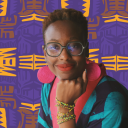This February, The Black Feminist Fund convened 100 members of the Black Feminists in Philanthropy Network (BFiP). This was part of the broader Black Feminisms Forum which brought together 400 Black feminist organisers, activists, scholars, artists and philanthropy leaders in Barbados to dream of the Black feminist worlds we deserve, need, and in fact are already building. A few weeks later, I still don’t have adequate vocabulary to describe the Forum’s importance and necessity for all in the room and online.
The Forum taking place in Barbados was intentional. Under the leadership of Prime Minister Mia Mottley, Barbados has strengthened relationships with the global Black diaspora, joined the demand for reparations, and partnered with us to make the forum a success. It was also important for us to host the 2024 forum in the Caribbean.
As uncovered in our report, Where is the money for Black Feminist Movements, only 2 percent of all development funding went to Black feminist organising in the Caribbean. Despite the power and history of Black feminist organising in the region, they are under-resourced and we want that to change. We held the forum in the region to highlight Black feminist leaders there and to put a spotlight on those most impacted by philanthropy’s negligence.
Taking up space on land where Black bodies once bloodily toiled and worked felt heavy, yet had to be honoured. It was a reminder of the deep rooted resistance that came before, and the collective responsibility to ensure the forum enabled deep dialogue, and the sharing of tools, knowledge and strategies that would fortify Black feminist organising.
Getting to the Forum, took a village. The four day convening was curated by a global and intergenerational team of Black feminists between the ages of nine and 68 . The Forum was a balm, a healing song calling us all into ourselves and each other. We explored the interconnectedness of resistance movements around the world.
From, from South Africa to Brazil and France, we celebrated and grieved the feminists no longer here, and carved out dedicated space for children, youth and elders’ spaces, recognising the central role they must play in importance of this intentionality of world building. We entered 2024 with multiple crises, and though they are still there, and the work required is great, we left the forum with the fervent knowledge that with Black feminists building across the globe, we gon’ be alright. This work is collective, and we are not alone in dreaming bountiful, beautiful Black feminist worlds.
It was power, and it was powerful.
On the final day we brought together the Black Feminists in Philanthropy network (BFiP). BFiP is a 160 + strong movement of Black women and gender expansive people working across more than 100 philanthropic institutions, and spanning 30 countries across the globe. Our aim is to increase resources directed at Black feminist movements, moreover ensure such movements are resourced to win, recognising that when we win, the world wins. BFiP exists within a sector that is inherently colonial and often harmful, redistributing resources gained through extractive accumulation either centuries ago or now. BFiP holds these tensions and contradictions, and recognises that whilst the revolution won’t be led by philanthropy, it will be led by Black feminist movements. Such movements are doing lifesaving and life-giving work to transform oppressive systems in real time, and this must be resourced and resourced well with sustained and untethered capital. Funding Black feminist movements like we want them to win, means the world wins.
The morning of the forum opened with a panel discussion moderated by Monique Morris alongside Dominique Morgan, Caroline Kouassiaman, and Crystal Hayling sharing their lessons and insights on resourcing different Black feminist models. Emboldened by the panel’s bold and generative points, we spent the rest of the day workshopping how we can remove the barriers many of us face when trying to radically resource Black feminist movements, and the steps required to build and deepen a strategic and visionary Black feminist base in philanthropy. This day, much like the wider Forum, enabled us to learn deeply from and with each other, building out the possibilities of what we can do individually, in our institutions and most importantly together as a network.
Before Barbados, BFiP meetings have taken place virtually, and even here they go beyond holding collective space. As Crystal Hayling, former Executive Director at Libra Foundation says, we must all understand our assignment which is organising an unprecedented amount of resources to Black feminist communities. Outraged by the apathy of philanthropy in regard to the war in Sudan, BFiP members strategised together, mobilising $1.2M and counting, that has moved to Sudanese feminist organisers who are providing humanitarian assistance, offering shelter to the displaced and much more. Co-Founder of Black Feminist Fund, Hakima Abbas detailed this work last year here. As usual Black feminists showed up, when others did not. We always understand the assignment, and intrinsically recognise the interconnectedness of crises around the world, noting that nobody is free, until we are all free.
As we mark International Women’s Day, it is important to reflect on all that has been done, but also pertinent to reflect on the how. BFiP is a powerful force because we are able to dream and strategise together. Intentional spaces to convene are central to resisting patriarchy and fortifying our toolkit. It is important for philanthropy to understand this and ensure that the funding directed to communities enables this, as well as their core work. If you are a Black woman or gender expansive person working in philanthropy and want to be a part of a growing coalition moving and increasing resources to Black feminist movements, let us know here.
Black Feminists in Philanthropy understand the assignment do you?
Vanessa Thomas is the Program Manager at the Black Feminist Fund. Vanessa also currently serves as a Trustee at Forward, a Steering Group Member for the Baobab Foundation, and is the Co-Founder of Diasporic Development.





Comments (0)